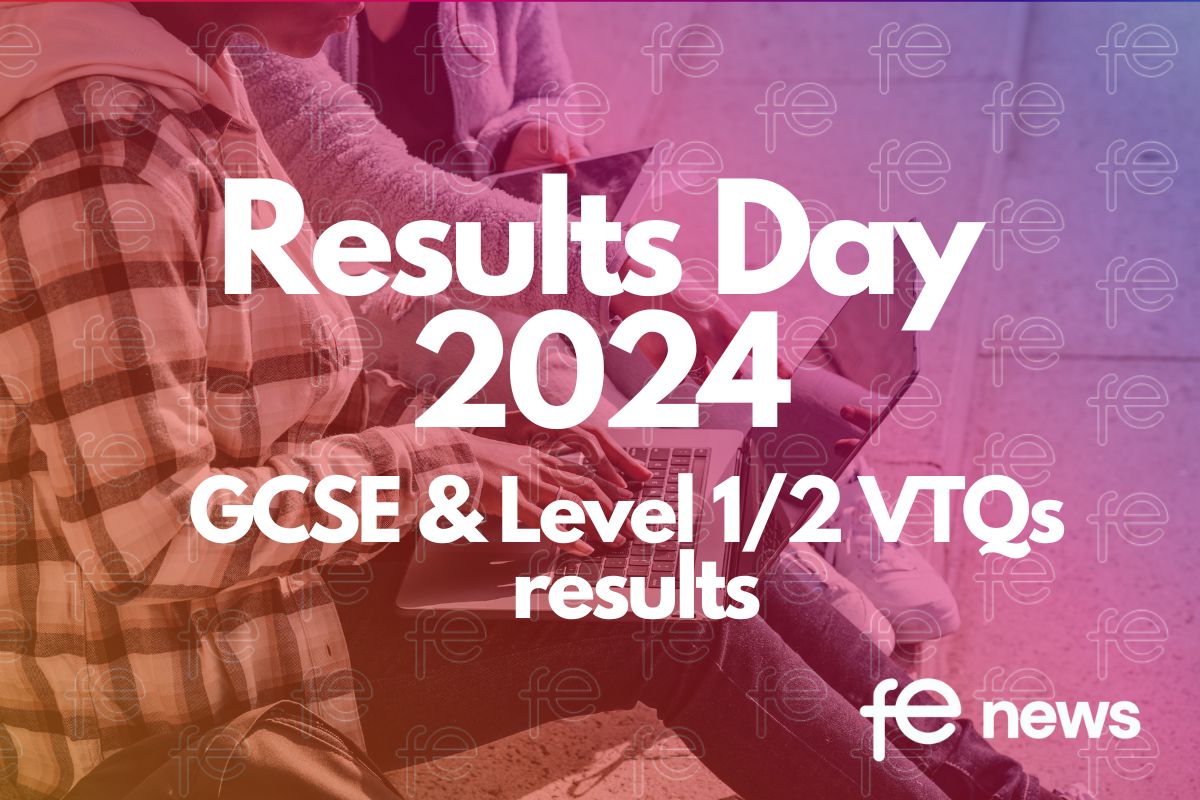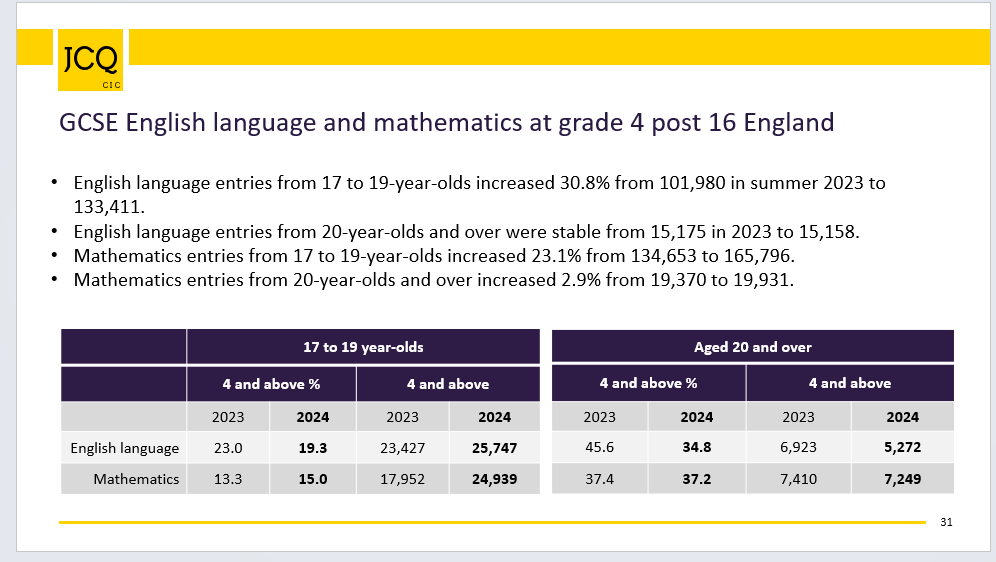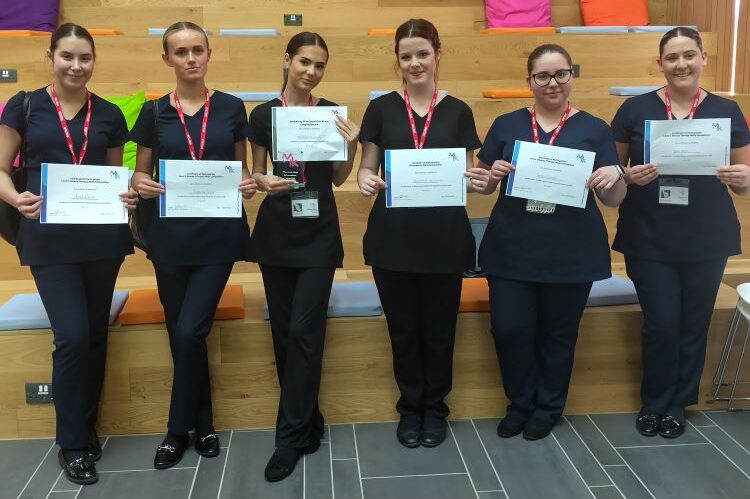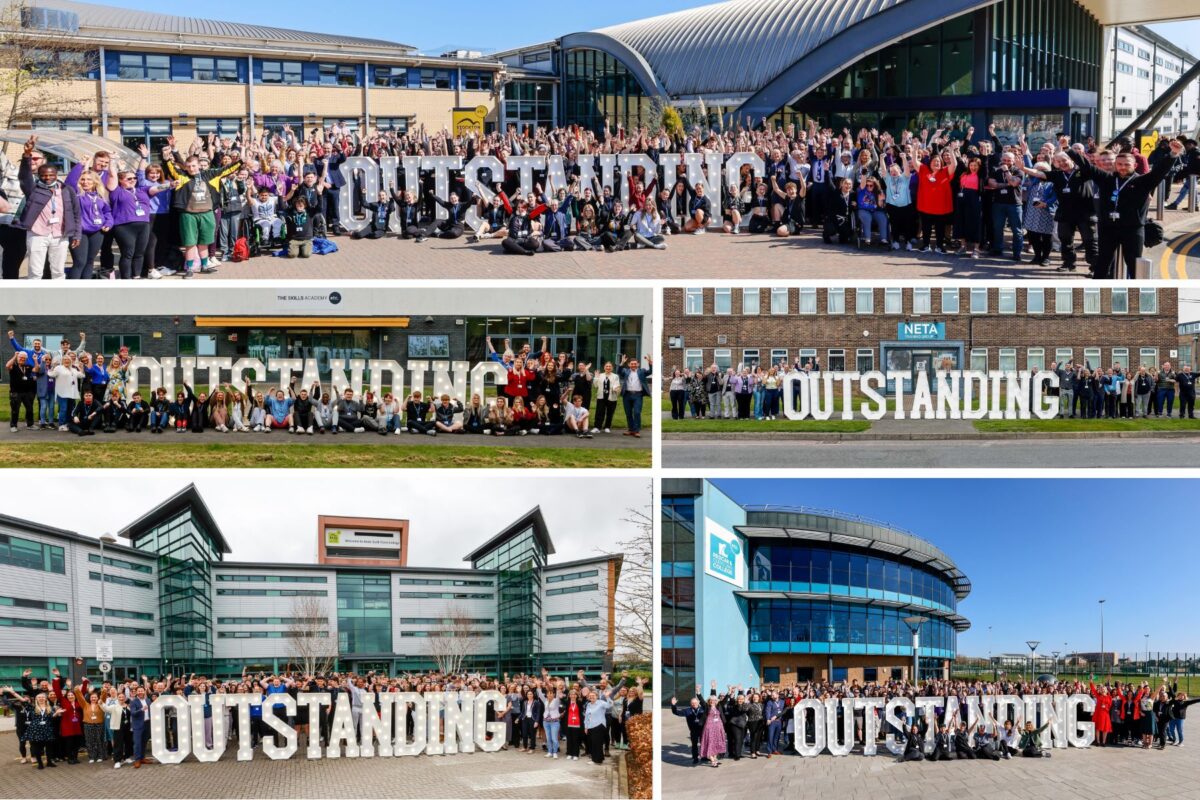GCSE and VTQ Level 1 and 2 Results Day. Significant Rise in English and Maths GCSE entries for Older Students.

JCQ publishes GCSE and Level 1 and 2 Vocational and Technical Qualification results for biggest ever assessment series with 6.5 million results issued.
- Entries for GCSE have increased by 4.8%. Over 667,000 16-year-old students are celebrating GCSE results in England with 70.4% of their entries achieving grade 4 and above this year
- Students aged 17 and over: GCSE English language entries up 25.8% and Maths entries up 20.0%
- Awarding organisations have awarded 372,900 Level 2 and 1/2 VTQ results in over 100 different qualifications – including, for the first time, new Tech Awards, which account for the vast majority of these results today.
DfE highlighted regional gaps in attainment remain significant. London and the North East continue to be the highest and lowest performing regions respectively, with the difference in grades 7 or above between up to 10.7ppt , compared to 9.3ppt in 2019.
Today, the Joint Council for Qualifications (JCQ) publishes 2024 results for the biggest ever assessment series in England, Northern Ireland and Wales. More than 6.5 million results (6,559,779) have been issued across a broad range of GCSE, and Level 1 and 2 vocational and technical qualifications (VTQs).
The approach to grading returned to pre-pandemic arrangements in England last year, and this year Northern Ireland and Wales completed their transition to pre-pandemic arrangements.
Entries for GCSE have increased by 4.8%
Entries for GCSE have increased by 4.8% to 6,186,879, compared with 5,905,000 in 2023 and 5,547,447 in 2019. Students are opting for a wide range of subjects, with music, art and design subjects, history, Spanish, business studies, computer science and statistics all recording increases in entries.
Results for GCSE students are in line with previous years – with 21.8% of grades at 7/A and above (compared with 22.0% in 2023 and 20.8% in 2019), and 67.6% of grades at 4/C and above (compared with 68.2% in 2023 and 67.3% in 2019).
This year results also show that:
- 22.6% of English 16-year-old entries achieved a grade 7 and above, similar to 2023 (22.4%) and 0.8 ppt higher than 2019 (21.8%)
- 70.4% achieved grade 4 and above, similar to 2023 (70.3%) and 0.5ppt higher than in 2019 (69.9%)
- Regional gaps in attainment remain significant. London and the North East remain the highest and lowest performing regions with the difference in grades 7 or above between the regions remaining stable at 10.7ppt for all ages, compared to 9.3ppt in 2019.
- Secondary selective schools continue to have the highest proportion of grades at 7 or above (60.3% at all ages) followed by independent schools (48.4%) and academies (21.2%).
- Apart from art and design, all arts subjects have seen a decrease in 16-year-old entries since 2019. The largest declines are in performing and expressive arts (-28.7%) and Drama (-14.4%), with both subjects having also seen decreases in entries from 2023.
- Entries in PE from 16-year-olds have also declined by 2.9% since 2019.
Post 16 GCSE data

- 16-year-old entries up 4.0% from 2023.
- GCSE English language, entries for students aged 17 and over increased by 25.8%.
- GCSE Maths, entries for students aged 17 and over increased 20.0%
GCSE English language and mathematics at grade 4 post 16 England
English language entries from 17 to 19-year-olds increased 30.8% from 101,980 in summer 2023 to
133,411.
- English language entries from 20-year-olds and over were stable from 15,175 in 2023 to 15,158.
- Mathematics entries from 17 to 19-year-olds increased 23.1% from 134,653 to 165,796.
- Mathematics entries from 20-year-olds and over increased 2.9% from 19,370 to 19,931.
VTQ: This is the first year of awarding results for the new Tech Awards
Today’s results also show the range and quality of achievements of those studying for VTQs. Awarding organisations have awarded 372,900 Level 2 and 1/2 VTQ results in over 100 different qualifications – including, for the first time, new Tech Awards, which account for the vast majority of these results today. The largest sector subject area for the new Tech Awards is leisure, travel and tourism; followed by
arts, media and publishing.
Education Secretary Bridget Phillipson said:
“Congratulations to each and every young person receiving their results today and thank you to the dedicated teachers and staff who have worked tirelessly to guide and support them.
“These pupils have shown remarkable resilience and determination, defying unprecedented disruption throughout the pandemic, RAAC and strike action. From A levels and T Levels to apprenticeships, they now have an exciting range of options available to them.
“We know this week’s results are likely to show the same unacceptable, entrenched regional disparities we have seen time and time again. That is why we are committed to breaking down barriers to opportunity – including by delivering a broader, richer curriculum – and ensuring that young people in all corners of our country can reach their potential.”
Schools Minister, Catherine McKinnell said:
“I want to congratulate both students and teachers on their achievements today despite the many challenges they’ve had to overcome over the past few years to get here.
“While this is a moment to celebrate, I am deeply concerned about the inequalities in our education system with where you live and what type of school you attend still being too big an influence on your opportunities.
“Our review of the curriculum will break down barriers and ensure art, sport, music and drama are no longer the preserve of a privileged few.”
Welsh Cabinet Secretary for Education, Lynne Neagle, has congratulated learners who have received their GCSE, Welsh Baccalaureate and Vocational Qualification results today.
“I would like to offer my congratulations to everyone who is receiving their results today. You will have no doubt been impacted by the pandemic but receiving your results today is a big milestone. You should all be very proud of the hard work, dedication, and resilience you have shown.
“This year is our final step back towards pre-pandemic exam arrangements and today’s results are where we expected them to be with outcomes similar to 2019.
“I would also like to thank our teachers and education workforce who have worked incredibly hard to support our learners to succeed.
“I hope you got the grades you wanted but remember there are many different choices for your next step into learning or employment. Get in touch with Careers Wales, your school or local college for support.
“Pob lwc, and best wishes for the future!”
Jill Duffy, Chair of JCQ Board of Directors and Chief Executive of OCR, said:
“What I love about this time of year is seeing the huge variety of qualifications that our young people are mastering, whether GCSE or Vocational and Technical Qualifications. Today’s results give them the basis for their next steps in education or training and I am sure this resilient generation will go on to even greater successes in the future.
“This year’s students have a lot to be proud about and I’d like to congratulate them all for what they have achieved. We’re seeing a record number of results issued today, and every one of them represents a student’s hard work, as well as that of their teachers, parents, and support staff.”
Margaret Farragher, JCQ’s Chief Executive, said:
“Well done to students across the UK receiving GCSE, vocational and technical qualification results today. These achievements are hard-earned and students should feel justly proud to have reached this important milestone in their educational journey. We wish them every success as they take their next steps.
“I speak for everyone at JCQ when I say how grateful we are to school and college leaders, teachers and exams officers who have supported students and worked tirelessly to deliver a smooth exam series this year.”
Liberal Democrat Education Spokesperson Munira Wilson MP said:
“Congratulations to all those who are getting their results today. Every pupil who sat exams this year should be very proud of what they have achieved.
“However, as we saw last week with A Level results, there will be thousands of students across the country whose education has been disrupted by crumbling RAAC in their schools, leaving their schooling in turmoil. The estimated 19,700 children taking GCSEs who have been affected by RAAC should be able to access a special appeals process which would allow schools to appeal for higher grades. “There has been a growing gap between the attainment of disadvantaged pupils and their more affluent peers and this is something that must be tackled. It is vital that all children, regardless of their background are given the opportunity to reach their full potential.”
Vocational and Technical Qualifications:
- 372,900 VTQ results have been issued today, across nine sector subject areas.
- 360,200 results were for Tech Awards – awarded for the first time this year.
- 12,700 were Tech Certificates.
- Leisure, travel and tourism is the most popular sector subject area.
- Over 13,000 (3.5%) of awards were at the top grade.
GCSEs:
Overall entries
- GCSE entries up 4.8% to 6,186,879 compared with 5,905,000 in 2023.
- The 16-year-old population increased by 4.6%. Most entries for GCSE subjects were from 16-year-olds, totalling 91.4% of all entries, which is down 0.7 percentage points (pp) from 2023.
- The average number of GCSE entries for 16-year-olds remains stable at 7.76 (7.78 in 2023).
- Entries from students aged 17 and over are up 20.5% to 430,377 compared with 357,207 in 2023.
- In 2024, students aged 17 and over represent 7.0% of all entries compared with 6.0% in 2023.
Subject entries
Top 10 subjects with highest number of entries remain unchanged:
- Science Double Award†† 980,786 (up 4.8% on 2023, and +16.9% since 2019)
- Mathematics 878,165 (up 6.9% on 2023, and +12.8% since 2019)
- English language 845,834 (up 7.2% on 2023, and +10.5% since 2019)
- English literature 655,905 (up 4.5% on 2023, and +11.7% since 2019)
- History 325,437 (up 4.6% on 2023, and +16.7% since 2019)
- Geography 297,411 (up 1.4% on 2023, and +12.2% since 2019)
- Religious studies 245,019 (up 0.5% on 2023, and -1.6% since 2019)
- Art and design subjects 208,934 (up 5.4% on 2023, and +6.6% since 2019)
- Biology 194,925 (up 1.9% on 2023, and +9.8% since 2019)
- Chemistry 185,274 (up 0.7% on 2023, and +9.0% since 2019)
Since 2023, there have been big increases in subjects with more than 100,000 entries:
- English language +7.2% from 788,780 to 845,834
- Mathematics +6.9% from 821,322 to 878,165
- Spanish +6.2% from 125,651 to 133,395
- Business studies +9.7% from 123,166 in 2023 to 135,090 – the biggest increase in the proportion of entries.
Subjects with under 100,000 entries which have also increased in popularity include:
- Statistics +19.9% from 26,559 to 31,844
- Music +8.7% from 32,980 to 35,861
- Computer science +5.8% from 90,558 to 95,841
Results
Overall GCSE results in comparison with 2023 (all ages – cumulative percentages by grade):
- 7/A down 0.2 pp from 22.0 to 21.8% (1,348,975 grades awarded in 2024, +50,311)
- 4/C down 0.6 pp from 68.2% to 67.6% (4,182,343 grades awarded in 2024, +152,240)
- 1/G down 0.1 pp from 98.0% to 97.9% (6,059,514 grades awarded in 2024, +274,455)
Overall GCSE results in comparison with 2019 (all ages – cumulative percentages by grade):
- 7/A up 1.0 pp from 20.8% to 21.8% (1,348,975 grades awarded in 2024, +192,492)
- 4/C up 0.3 pp from 67.3% to 67.6% (4,182,343 grades awarded in 2024, +448,593)
- 1/G down 0.4 pp from 98.3% to 97.9% (6,059,514 grades awarded in 2024, +606,389)
Overall results for 16-year-olds at all GCSE grades (7/A, 4/C, 1/G) remain higher for female students compared to male students. However, there has been a slight reduction in the difference:
- At 7/A the difference between females and males results has reduced 0.2pp compared with 2023.
- At 4/C the difference between females and males has reduced 0.1pp compared with 2023.
- At 1/G the difference remains the same as in 2023.
Sector Reaction to GCSE and VTQ Level 1 and 2 Results Day
Commenting on today’s GCSE and VTQ results, Pepe Di’Iasio, General Secretary of the Association of School and College Leaders, said:
“Congratulations to students on their results, and to their teachers who have worked so tirelessly to prepare and support them for these examinations. This is the culmination of a great deal of hard work in often challenging circumstances and it is a huge achievement that so many young people will now progress with confidence onto courses in colleges and sixth forms.
“But we must recognise that this is not the story in England for a significant proportion of students who fall short of achieving at least a Grade 4 GCSE pass in English and maths, and so will be consigned to a remorseless treadmill of resits in post-16 education under rules drawn up by the last government. As this year’s results show, most of these students once again fall short of the Grade 4 benchmark in their resits. This is completely demoralising
“It is imperative that the government’s curriculum and assessment review considers how we can do better for these young people – and a good start would be to scrap the requirements which compel mass resits.
“Today’s results also show significant differences in regional outcomes for GCSEs in England, particularly between the results in London and the South East compared to the North and Midlands. This suggests that relative levels of prosperity and socioeconomic disadvantage continue to play a huge part in educational outcomes, and addressing these gaps must be a key priority for the new government working alongside the education sector.
“We have to do more to support our schools and colleges. Funding and teacher shortages, combined with post-pandemic issues around mental health, behaviour and attendance, have made circumstances particularly challenging. An improvement to school and college funding in general, and the special educational needs system in particular, is absolutely key to improving matters. The government must grasp this nettle in the autumn budget.”
Teach First CEO Rusell Hobby said:
“Congratulations to all pupils receiving their GCSE results this morning. While many will be celebrating today – we know pupils from poorer background are significantly less likely to be receiving top grades. This is despite them having the same hopes, dreams and potential as their wealthier peers.
“Great teachers are key to cracking this – so we need to pay them fairly, treat them well and get them to the communities where they can make the greatest difference. A results day where every child receives the grades they deserve is possible, but that means investing in their futures today.”
Paul Whiteman, general secretary at school leaders’ union NAHT, said:
“We warmly congratulate students as they receive their results across a wide range of qualifications. Today’s results are a testament to the hard work and dedication of students and the school and college staff who have supported them.
“Students receiving their results today should feel especially proud of what they have achieved – they navigated the start of secondary school during the pandemic, some have been taught in unfit school buildings, and support from the previous government left much to be desired.”
Resit policy
“The current GCSE maths and English resit policy must be scrapped. English language entries from 17 to 19-year-olds increased 30.8% and Mathematics entries increased 23.1% this year. But only 19.3% of those students achieved a grade 4 and above in English Language, the figure for maths is 15%.
“Those students who haven’t achieved the required grade are forced into repeated resits which are demotivating and can lead to disengagement with their learning
“The most important outcome for students is that they have the necessary numeracy and literacy skills to continue their education or training and progress towards their chosen career.
“For some young people alternative qualifications in maths and English would be a more positive and effective way to demonstrate their achievements and government policy should allow much more flexibility.”
On regional disparities:
“Although there are some marginal improvements in regional disparities, the gap between the lowest and the highest percentage of students achieving 4/C or above has grown from 8.7% in 2023 to 9.4% in 2024.
“Such inequalities have been exacerbated over the last decade by funding cuts to schools and community services, the pandemic, and the cost-of-living crisis.
“Schools do their best to support pupils and close those gaps, but they cannot do this alone. Unfortunately, the previous government failed to provide anything like the resources needed to address these inequalities.
“We welcome the new education secretary’s pledge to address regional disparities. We ask that this approach goes beyond the school gates, and looks at services like social care and mental health to enable children everywhere in the country to thrive at school.”
On exam anxiety
“Our members have definitely seen a rise in the requests for access arrangements, particularly for students to take their exams away from the main hall in smaller rooms.
“That rise in requests is likely to be a result of a variety of factors including the impact of the pandemic and increasing anxiety and mental health issues. Those may be exacerbated by the number of high stakes final exams students face in their GCSE subjects.There is also more awareness amongst students and parents of what is available to help students cope with exams and get the support that they need.
“It can be challenging for schools to meet that increasing demand for separate or small room invigilation as it needs additional staffing and space. Schools and colleges will need more support to meet their students’ needs going forwards.”
Lisa Capper MBE, CEO & Principal at Stoke on Trent College:
“GCSE results day is a nerve-wracking time for young people but whether you (or your young person) receive the grades you wanted or not, there are options to move forward into the future you deserve. There is a course, Apprenticeship, training or work experience placement out there that is right for you. If you have just missed out on the critical subjects, there is an opportunity for you, along with an opportunity to re-sit your GCSEs in English and/or maths, all at Stoke on Trent College.
“Always remember that nothing can stop you from getting where you want to be. You have what it takes to aspire, achieve and progress and there are still ways to get where you want to be and fulfil your potential.
“The most important thing is to stay positive. It’s not the end of the world and in time you will come to realise this. It’s vital to pick yourself up and, most crucially, take action. Just because you didn’t get the results needed for the course you wanted, it doesn’t mean the door is closed. You can still enrol, but will either need to retake English and maths if you didn’t get the required grade or do a different English and maths qualification. These core subjects are incredibly important for work and further study so achieving these is essential.
Whatever your results you can be sure of a warm welcome and a brighter future at Stoke on Trent College.”
Charlotte Ibbotson, Director of Talent at mthree, commented:
“GCSE results day is a milestone which signals the start of many young people’s career journeys, as students start thinking about the transition between education and the working world and consider: “what’s next”?
“For many years, A-levels and a university degree have been considered pre-requisites to entering highly skilled careers in areas like technology and banking. For those who choose not to go down the higher education route, the primary alternative has been to pursue an apprenticeship in a vocational field. But young people need to be aware of all the opportunities available to them as they progress through the next couple of years of post-GCSE learning – during which time they’ll have some big decisions about their future to make. While apprenticeship and degree pathways are both rewarding in their own rights, they are not the only options when you reach 18.
“For context, the introduction of emerging technologies mean businesses must diversify the workforce while plugging widening skills gaps in tandem. To do this, employers must open hiring efforts to a wider talent pool. For example, not everyone has the ability, or support, to pursue a degree or take on unpaid internships to gather experience. However, hiring talent from non-degree backgrounds can support social mobility in the workforce adding new experiences to a team.
“At mthree, one way that we equip talent from non-degree backgrounds to feel “job-ready” is by working closely with employers. We help them understand the skills they need before providing tailored training to talent aged 18 years and above. This training covers two areas – technical skills and professional development. New recruits are supported in gaining certifications and exposure to new software and tools, and equipped with skills like critical thinking, communication, and problem-solving. We then deploy them to work onsite with the organisation, drawing on their new skills.
“Ultimately, the world of work – and the pathways to enter into it – are changing. Those opening their results this week should feel optimistic about the breadth of opportunities available to them, rather than pigeonholed into one of two popular routes.”
Irfan Latif, Headmaster at Oxford Business College comments:
“I am absolutely delighted for our 2024 GCSE cohort and proud to be celebrating two record-breaking sets of results this summer alongside the whole RHS community. I would like to extend my sincere thanks to the dedicated team of teachers and wider colleagues at RHS, whose unwavering dedication and commitment has provided pupils the opportunity not only to achieve their academic potential, but to explore their passions through a wide range of co-curricular achievements. I’d like to provide particular recognition to the exceptional leadership of Headmaster Simon Lockyer, and Deputy Head (Academic) Catherine Stevens, who have left a lasting legacy at RHS and provided firm foundations for the continued success and growth of the school.
I am immensely proud of the RHS community and look forward to welcoming back many of our GSCE pupils to the Sixth Form in September. As RHS sails into an ever-changing and challenging world, it remains steadfast in its mission to provide an education that prepares pupils not just for exams but for life. The school’s blend of tradition and 21st century innovation creates an environment where pupils can thrive academically, socially and emotionally, and I am excited to navigate RHS through this exciting new chapter.”
Becca Gooch, Head of Research at EngineeringUK comments:
“Congratulations to everyone receiving their GCSE results today. “EngineeringUK is a charity that wants to see more young people from all backgrounds progressing into engineering and technology and today’s results provide some encouraging signs. Entries to Computing are up by 5.8% (compared to overall growth in entries of 4.8%). This is driven by an increase of 10.3% in the number of girls taking the subject. On the flip side, while entries to Design and Technology have increased, at 2%, this represents a smaller increase than overall entries and is part of a longer-term decline in uptake of the subject. Entries have more than halved since 2016 – from 185,279 to 88,607 in 2024. “We know that students are motivated by opportunities for practical science but that these opportunities have almost halved since 2016. D&T provides students with contextualised, hands-on learning opportunities and is an important subject for future STEM careers. “There’s more to be done to ensure more students from all backgrounds take Computing, D&T and other STEM subjects at the greater levels required if the UK’s need for a skilled workforce to meet net zero targets is to be met.”
Chris Paterson, co-CEO of the Education Endowment Foundation (EEF), said:
“Today is a momentous day for pupils receiving their GCSE results and the teachers that have supported them through years of hard work. This cohort had those crucial early years secondary school disrupted by the pandemic, so deserve our congratulations and support.
“These results are passports to future opportunities, whether in employment, training, or education. So, it is of particular concern to see the north / south divide at this level, reaffirming that our education system is not a level playing field. Similarly, the large gap at top grades between comprehensive and independent schools is further indication of the entrenched inequality in our system. Fulfilling your potential at school shouldn’t be down to your postcode or how much your parents earn but sadly, this still has a major impact on attainment. “The trends in results today should act as a guiding light to the new government as they determine their priorities for education reform.”
Charlotte Bosworth, Chair of Federation of Awarding Bodies said:
“Congratulations to all students receiving their Level 2 and Level 1/2 results today! Whether you’re planning to pursue further study, training, or employment opportunities, we wish you the very best for your continued success. Our thanks also go to the AO and centre staff for their dedicated efforts throughout the year.”
Welsh Cabinet Secretary for Education, Lynne Neagle commented:
“I would like to offer my congratulations to everyone who is receiving their results today. You will have no doubt been impacted by the pandemic but receiving your results today is a big milestone. You should all be very proud of the hard work, dedication, and resilience you have shown.
“This year is our final step back towards pre-pandemic exam arrangements and today’s results are where we expected them to be with outcomes similar to 2019.
“I would also like to thank our teachers and education workforce who have worked incredibly hard to support our learners to succeed.
“I hope you got the grades you wanted but remember there are many different choices for your next step into learning or employment. Get in touch with Careers Wales, your school or local college for support.
“Pob lwc, and best wishes for the future!”
Debanjali Ghosh, Technical Evangelist, at ManageEngine, comments:
”The rise in entries in subjects like computer science, mathematics, and statistics means more students are finishing GCSEs with the foundational skills required for our digital future.
“To build momentum, we need to ensure more students are excited about the opportunities in digital jobs, from IT operations to cybersecurity. One way to do this is to publicise different routes of entry, like apprenticeships, or highlight existing workplace training that supports skills development through coaching, mentoring, and short, accredited courses.
“There’s still a long way to go to ensure all students across all ethnicities, genders, and economic backgrounds are provided resources to pursue digital industries. But it’s pleasing to see a deeper pool of candidates who are set to be the next wave of the new digital workforce.”
Qasim Hussain, Vice President Further Education, NUS said:
“Congratulations on getting your GCSE results! No matter your grades, you should be so proud of yourself for all the hard work you put in.
“Your grades do not define you. If you haven’t got the grades you expected, don’t panic. It may feel like the end of the world, but there are lots of ways to achieve your goals, be that sixth form, college or an apprenticeship.If you don’t know what you want to do, make sure to talk to your teachers, or guidance or careers counsellors to help identify what is the right path for you.
“I am excited to see you as part of the student movement! If you’re going to a sixth form or college, get involved in your students’ union. If you’re going into an apprenticeship, get involved with the National Society of Apprentices.”
University and College Union (UCU) general secretary Jo Grady said:
“Congratulations to all students receiving their GCSE’s and level 2 results today, and to the staff who have spent years teaching and supporting them. Unfortunately, despite their best efforts, many students will be deemed to have failed their maths and English exams and be forced to retake them.
“This should be the last year that students are forced to endure the resit nightmare. Labour’s curriculum and assessment review should begin by recognising student’s diverse array of talents and focus on empowering students to study subjects they enjoy and enable them to thrive.”
Louis Hodge, Associate Director for School System and Performance at the Education Policy Institute (EPI), said:
“As expected, today’s results represent stability with outcomes similar to what we saw last year. This follows two years of falls as the grading system unwound the effects of the pandemic when the use of centre and teacher assessed grades led to large increases in grades in 2020 and 2021.
“While outcomes are now broadly the same as they were in 2019, it is important to remember that students receiving their results in GCSEs, BTecs, and other vocational qualifications today have had their secondary education significantly disrupted by the effects of the pandemic.
“Following the pandemic’s disruption and over a decade of austerity, the education system in England faces significant challenges in the years ahead. Amongst them are the high levels of pupil absence, geographical inequalities, and a growing attainment gap between pupils from low income backgrounds and their peers – equivalent to 19 months of learning by the time they sit their GCSEs.”
Rachel Phillips, Vice President UK&I at Okta Comments:
“On GCSE results day, it’s encouraging to see more girls taking an interest in STEM with female applicants for these subjects increasing year on year. Despite this, there’s still a long way to go and increasing the diversity within STEM will require more than media statements and LinkedIn posts. It requires systemic change in the education system, and role models from minority backgrounds to step forward to inspire and motivate young people to want to pursue a career in STEM.
This year my son will be receiving his results, with so much pressure on today’s youth I will be reminding him that his and his peers’ career paths can take many forms and do not necessarily require a stream of accreditations. For example, I took an access course after A-levels to study engineering and believe this was one of the best decisions I made.”
Sir Peter Lampl, Founder of the Sutton Trust and Founder of the Education Endowment Foundation, said:
“Youngsters receiving their GCSE results should be proud of their achievements, especially considering the major disruption this generation has faced in recent years.
“It is concerning that the gap in attainment between private and state schools has widened this year. This reflects a broader pattern of widening gaps between the most and least well-off young people since the pandemic and cost of living crisis.
“The stubborn regional disparities in attainment are unchanged. London continues to outperform the rest of the country, and the North East is still the region with the lowest level of top grades. Looking at pass rates (grade 4 and above), all regions have seen drops, but the West Midlands, which had the lowest rate of passes last year, has dropped the most.
“To close these gaps and enable pupils to reach their potential, we need sustained investment in teaching, particularly in areas with lower attainment.”
David Lakin, Head of Education at the IET, said:
“We’d like to congratulate all students receiving their GCSE results today. It’s positive to see that Science and Mathematics remain the top two subjects, with significant increases in Statistics and Computer Science and an uplift in Design and Technology – all of which could open the door to an exciting and creative career as an engineer or technologist.
“We know that the appetite for studying and working in Science, Technology, Engineering and Maths (STEM) is there, so we need to make sure young people now know how these subjects apply to their future ambitions, what roles in the STEM sector are available and what routes they can take to get there.
“A broad and balanced education for all young people is fundamental to the formation of future engineers, ensuring they have a rounded knowledge and the skills required for engineering a better world for us all.
“We need engineering to be recognised more widely within primary and secondary education. The country needs more people studying engineering subjects at university and taking up apprenticeships and that must start with uptake at GCSE level.”
Dr Laura Norton, IET Head of Equality, Diversity and Inclusion and WISE Managing Director, added:
“More males are studying Science, with significant gaps in Construction, Engineering, Computing and Design and Technology.
“This shows that there is still so much to be done to tackle the gender gap in STEM. We must inspire the next generation of women engineers, and this starts from a very young age. We need to be telling primary school children about the opportunities and range of careers within engineering and technology – so that they know that there is a place for them in the sector.
“Visibility and representation matters, so we need to be providing real life role models for the younger generation to look up to and to tell them first-hand about their experiences and how to get into the sector. Both the IET and WISE are working to highlight role models in the sector via the IET Young Woman Engineer of the Year Awards and WISE’s My Skills My Life platform – both showcasing the breadth and depth of people and roles in the sectors.”
“Many people still don’t appreciate how much society depends on the skills and knowledge of engineers, and without diversity in the profession, we won’t get the creativity, innovation and collaboration needed to solve the complex global problems we face. Work is being done across the sector but there is still a lot to do – and it requires consistent action from education, employers and Government.”
Marc Porcar, CEO of PRO S.L says,
“If your child has done well in their GCSEs, it is only natural to want to post about it on social media and share with family and friends how proud you are.
“However, it is important that parents are being cautious about what they post online.
“Whilst sharing results alone is ok, sharing them alongside an image of your child in their school uniform or tagging the college they’re heading could be risky.
“Sharing information or photos of their children on any social media platform, even if their account is private, ultimately leaves a digital footprint.
“Firstly, this can lead to future problems such as university decisions or job applications. What the internet says about your child, this can impact these outcomes.
“Also, if any shared images of personal information, get into the wrong hands of a cybercriminal- such as a child’s full name, birthdates and approximate school and address- this can have serious repercussions, from cyberbullying to identity theft.
“Putting personal information online for the world to see is risky for anybody, especially children under 18.
“It’s important for parents to think twice about what they share publicly.”
Cath Sezen, Director of Education Policy, Association of Colleges, said:
“Congratulations to all the students receiving GCSE results today and to the teachers and support staff who work tirelessly to make sure you get the best results you can. For any students who have not achieved the results you were expecting remember to seek advice from your school. Your local college has plenty of options available, at a level to suit you. They are ready and waiting to advise you on the best route for you.
“Congratulations too to the post-16 students who have achieved a grade 4 or above in English and maths at the second, third or more attempt; this is a big achievement, and we need to celebrate those who are successful. However, we do need to question whether there is a better approach for the 100,000 students who sat English and maths and weren’t successful in achieving a grade 4 or above. Up and down the country there will be teachers and heads of English and maths at a loss about what more they can do to shift the dial, while under pressure to provide English and maths teaching in the 2024/25 academic year to increasing cohorts of young people. “After 10 years of condition of funding the time is right to review government policy and look at a different way to support students to gain crucial English and maths skills, rather than putting them through a system which can leave many of them feeling that they have failed again and again.’’
Kirstie Donnelly MBE, Chief Executive of City & Guilds said:
“I wanted to say a huge well done to everyone receiving Vocational and Technical Qualifications and GCSEs across the country today. This is the cumulation of so much effort and hard work and learners should feel rightly proud at what they have achieved.
“With so many paths now open students have reached a key milestone in their lifelong learning and skills journey. At City & Guilds, we are proud to have played a part along the way and look forward to supporting many with the next stages too. Best of luck everyone.”
Sarah Austin, Director of British Business Excellence Awards, commented:
“The latest decline in GCSE pass rates across England, Wales, and Northern Ireland has significant implications for future economic prospects and recruitment strategies. A drop in grades might shift how employers view candidate potential, possibly leading them to adjust their hiring criteria.
“Nonetheless, it’s essential to recognise that grades are not the sole determinant of success. While they can open doors, they don’t define future achievements. Many successful individuals have thrived despite not having top grades. True success often stems from qualities like dedication, resilience and perseverance, traits that go beyond academic performance.
“Grades offer a snapshot of performance at a particular time but don’t capture a person’s full potential or worth. It’s the combination of hard work, adaptability, and personal attributes that truly shapes an individual’s future.”
Philip Le Feuvre, Chief Operating Officer at NCFE, said:
“Congratulations to everyone receiving their results today. After putting in so much hard work they should all feel very proud. I also want to thank the educators and providers whose dedication has supported them in following their ambitions.
“For NCFE, we’ve released almost 30,000 Level 2 results this summer, including a new model of V Certs being completed for the first time. We look forward to seeing all our learners take their next steps and fulfill their potential, whichever pathway they choose.”
Dr Patrick Roach, General Secretary of NASUWT – The Teachers’ Union, said:
“We congratulate students on their achievements this summer.
“With more and more demands placed on our schools and colleges, this is a reminder of the fantastic leadership and dedication of our teachers and headteachers, who work tirelessly to secure the very best outcomes for their pupils. They should be congratulated too.
“It is vital that every pupil, irrespective of background, has the opportunity to progress and achieve their full potential. So it is welcome that the Government has committed to a national plan to tackle child poverty. A national workforce plan is also essential to ensure that every pupil has the high quality professional support they need, irrespective of where they live.
“The Government’s stated commitment to tackling the disadvantage gap and ensuring that a pupil’s educational outcomes do not depend on their parents’ ability to pay must now be translated into a key spending priority by the new Government.”
Sarah Chapman, 3M senior technical manager and Women in STEM ambassador, said:
“As students receive their GCSE results today and look ahead to future opportunities, we need to uplift young people who are looking to get into the STEM industry, while also opening the door to those who may not have considered the industry as a viable career option for them. The future of the science and technology industries is bright, as nearly 7 out of 10 agree that jobs in STEM are the future of work. What’s more, STEM subjects can lead to a huge variety of jobs in music, sports and tech, beyond the traditional roles associated with the sector.All students should feel empowered to choose science, technology, engineering, and math subjects when the time comes to consider further qualifications and careers.”
Paul Emberlin, Group Director for Online Faculty at Activate Learning, said:
“This is always one of my favourite days of the year, where we get to celebrate the successes of our online learners and acknowledge the incredible work of our tutors and teams across the country.
“Returning to study as an adult learner takes courage, and each learner, many of whom have had to overcome significant barriers and balance work, family, and personal commitments, can take huge pride in their achievements today.
“We are immensely proud of their commitment to improving their English and maths skills and we take huge delight in the fact that through our online delivery we’ve been able to support them on their journey to further education, career progression, and greater self-confidence.
“Our Learning Philosophy-led online learning experience is designed to create not just academic success, but a transformative experience that equips students with the skills and mindset to thrive in their futures. We can’t wait to hear of all the amazing things they now go onto do.”











Responses